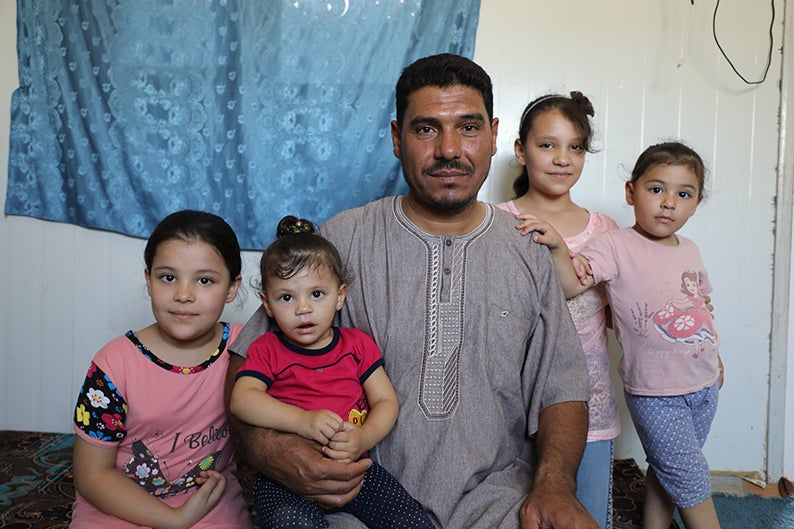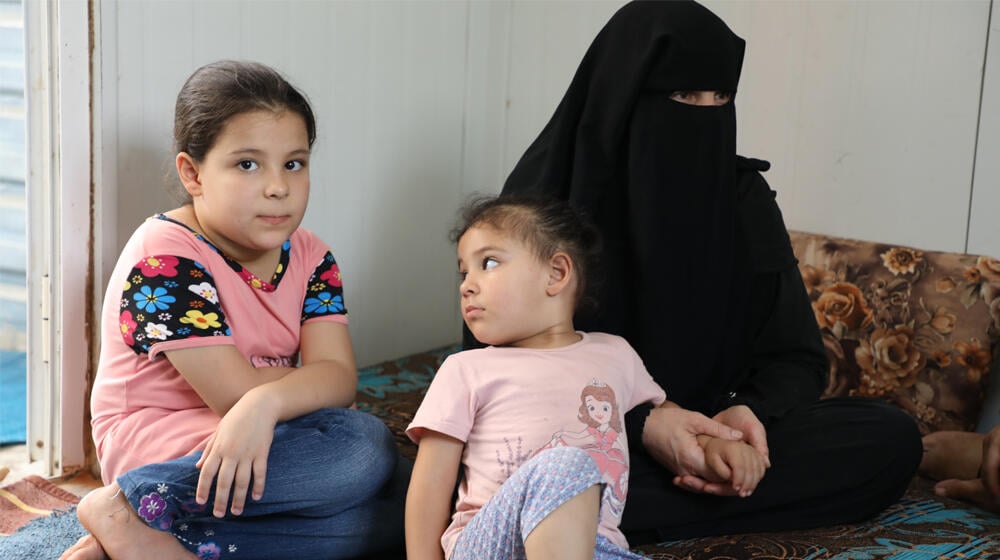Last March, Umm Muhammad, a 42-year-old Syrian refugee, gave birth to her eighth child, a healthy baby girl whom she named Rahil.
She was the third child born in Jordan after Umm Muhammad was forced to flee the violence back home with her family in 2013 and settle in Zaatari camp.
But most of her pregnancies, including the last one, had been difficult. She often had severe nausea and persistent vomiting. She also became dehydrated, weak, dizzy and required medical attention.
My pregnancies were very difficult. I had morning sickness and I used to throw up a lot. I was always fatigued
she said, as she was breastfeeding Rahil, in her sparsely furnished caravan at the camp.
I really suffered, and I couldn’t stand on my feet to do any cleaning or cooking for my family.
Umm Muhammad’s symptoms are compatible with hyperemesis gravidarum, the medical term for severe nausea and vomiting during pregnancy. If left untreated, she could have had suffered serious problems.
Refugee women living in camps like Umm Mohammad often face immense challenges in accessing sexual and reproductive health services (SRH), which are crucial to ensure healthy pregnancies and safe deliveries.
An estimated 2.8 million pregnant women and newborns die every year, mostly of preventable causes related to pregnancy and childbirth, according to the mortality estimates released by UNICEF, the World Health Organization (WHO), UNFPA and the World Bank Group.
While her life as a refugee is full of daily struggles, Umm Muhammad was fortunate enough to have access to health services at a reproductive healthcare clinic that helped her throughout her last three pregnancies and spared her the agony of unnecessary complications.
The clinic is operated by UNFPA implementing partner, the Jordan Health Aid Society (JHASi). It provides broad and free of charge services for Syrian refugees. These include antenatal and postnatal care, deliveries, newborn care, family planning, treatment of sexually transmitted diseases, emergency obstetric care like C-sections, in addition to laboratory testing.
In 2015, Umm Muhammad first heard about the clinic from her neighbors, when she was four months pregnant with her sixth child. Since then, she became a regular visitor to the JHASi clinic.
“The doctor knew how much I suffered during my pregnancies, so she used to give me medication that made me feel better. She also gave me iron supplements, calcium and a tetanus shot,” Umm Muhammad expressed.
The UNFPA supports more than a dozen of reproductive health care clinics in Amman Zarqa, Ramtha, Irbid and Mafraq including others in three refugee camps. It also supports three medical mobile units and outreach teams in the northern and southern parts of the country including the Jordan Valley. Those services reached 116,000 beneficiaries, according to a UNFPA regional situation report on the Syrian crisis published in 2020.
For Umm Muhammad, the services she received from the health clinic made her grateful.
“I have benefited a lot from the checkups and follow-up care. Thank God for the services!” she exclaimed.

She was even more grateful with the obstetric care she received, particularly after she went to see her obstetrician when she was two weeks away from her due date last March. The clinic referred her to a nearby hospital outside the camp since she was scheduled for a cesarean section delivery.
It was just in time before a nationwide lockdown was imposed to prevent the spread of the COVID-19 pandemic.
“When the doctor examined me, she told me it was better if I deliver on the same day rather than waiting because she was afraid that something might happen to me and I would not be able to manage on my own because of the lockdown,” she said. “God bless her, she did me a favor!”
########
Jordan Health Aid Society International (JHASI) is the national implementing partner of UNFPA/ Jordan for sexual and reproductive health sustainment at Zaatari Camp's Reproductive Health Clinic. EU Humanitarian Aid is the kind donor that supports the Clinic as well as the Women & Girls Safe Space in Zaatari Camp.


